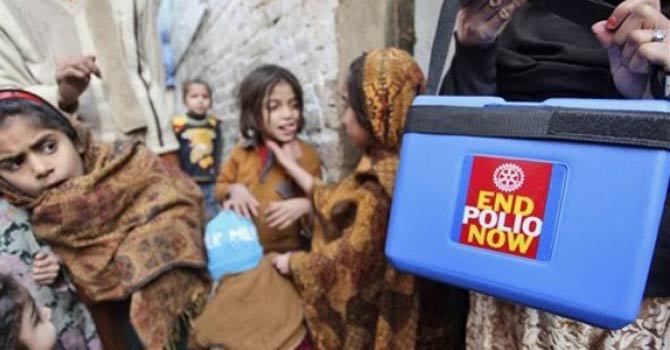Pakistan New Year's Polio Drive Runs into Hurdles
Pakistan's continuing battle against polio

NEW DELHI: Pakistan launched the new year’s first national polio campaign on Monday, targeting an estimated 34 million children across the country. The campaign follows news that there have been no fresh cases of polio in Pakistan thus far into the year.
However, the bad news is that due to security reasons and unavailability of trained staff -- the drive could not be launched in a few of the scheduled districts, rendering a number of children vulnerable to the disease. The security situation impacted Karachi -- where the drive will be carried out in three phases, and Balochistan, where the drive was postponed in five districts, namely, Zhob, Sherani, Loralai, Musa Khel and Qilla Saifullah.
Further, Balochistan’s Mansehra, Chitral, Battagram and some areas in Skardu were not included in the drive owing to harsh weather conditions. Bannu too saw a delay because of shortage of staff.
Last year, gunmen increasingly targeted polio workers in Balochistan. The restive province, which was polio free for two years, reported a case of polio in July this year, with subsequent cases and the rise in polio in the province being attributed to the refusal of parents to allow workers to administer the vaccine and violence directed at polio workers.
These two factors have in fact contributed to a resurgence of polio across Pakistan, making the country the only country in the world where polio is on the rise. 2014 in fact was the worst year yet, with four times as many cases of polio reported in Pakistan as compared to 2013.
The World Health Organisation has referred to Pakistan as the “greatest single risk to the achievement of global polio eradication.” In a report, the international health body said that Pakistan is responsible for 80 percent of the polio cases reported across the globe.
“The situation is primarily due to a lack of access to children for vaccination, largely owing to a continuing ban on immunisation imposed by militants in the North and South Waziristan, and insecurity and killing of polio workers in the field,” the report said.
There has been an increase in polio cases every year in Pakistan. The reason for this increase is partly attributable, as the WHO points out, to violence directed at polio workers, rendering Pakistan as one of three countries in the world, along with Afghanistan and Nigeria, where polio has not been eradicated.
In 2014, a new strain of polio was identified in Pakistan, with WHO warning that Peshawar has the world’s largest reservoir of the polio virus and that 90 percent of Pakistani polio cases were linked to this highly contagious strain of the disease which is found in Peshawar’s sewers.
The attacks against polio-workers in Pakistan escalated once it became known that the CIA had paid a Pakistani doctor, Shakil Afridi, to fake a vaccination campaign in Abbottabad, to acquire DNA samples from children inside a compound where al-Qaeda leader Osama bin Laden was based. The American intelligence’s scheme, in a bid to prove that bin Laden was in Abbottabad, involved comparing the DNA samples of the children to those of bin Laden’s sister, who had died in Boston in 2010.
This incident exacerbated the distrust of foreign intelligence services in Pakistan, and the Taliban have waged an all-out war against polio workers, repeatedly attacking health teams and denouncing vaccinations as part of a larger western/CIA agenda. The Afridi incident did grave damage to the credibility of the healthcare programme in Pakistan, which has seen previous success as polio figures declined from 350,000 to 250 in a span of twenty-five years.
The CIA came under widespread criticism for jeapordising the campaign. InterAction, a coalition of 200 non-governmental organisations, issued a statement reading: "The CIA's use of the cover of humanitarian activity for this purpose casts doubt on the intentions and integrity of all humanitarian actors in Pakistan, thereby undermining the international humanitarian community's efforts to eradicate polio.”
The distrust was fuelled by conspiracy theories that claim vaccinations are “un-Islamic” or an American ploy to sterilise children. The practice of marking houses that have been vaccinated, in order to differentiate them from houses that are still to be included in eradication efforts, was beset with rumours that vaccinators - accused of being CIA operatives - mark houses to be targeted by US drones.
The Taliban imposed ban on immunization has deprived about 170,000 children under the age of five from receiving polio vaccinations. The WHO states that Pakistan had almost 300 cases of polio in 2014, compared to 91 cases in 2013 and 58 cases in 2012, with many attributing the attacks on polio campaigns which have resulted in the lack of access to people in need of vaccinations as a key reason for this increase.
“Issues involving children’s access to immunisation and safety of vaccinators must be resolved to ensure that the programme can be completed,” the WHO report said.



